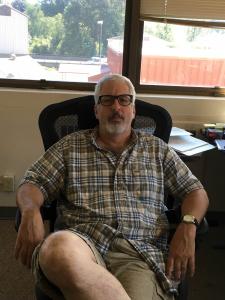Phillip Levin

Voices from the Science Centers
Voices from the Science Centers is an oral history initiative dedicated to documenting the institutional knowledge of fisheries scientists and administrators in the labs of NOAA’s Fisheries Science Centers.
Phillip Levin was born in Champaign, IL in 1962. He studied at the University of Texas receiving his Bachelor's in Zoology. During college, a fish class led to his interest in marine biology and field work. After teaching marine science at a San Antonio high school, he attended the University of New Hampshire where he received his PhD in Zoology. He then was an Assistant Professor at Texas A & M before he joined NOAA Fisheries at the Northwest Fisheries Science Center in 1999 as a Research Fisheries Biologist. As of this interview, he was completing his tenure as a community ecologist and conservation biologist during which he served as the lead for the Ecosystem Science Program since 2007 and Nearshore Ecology Team at NMFS NWFSC. In addition to his research and administrative duties, he worked with the native people in Haida Gwaii, British Columbia and founded both the Oceans Tipping Point Project and the Oceans Model Forum. Dr. Levin left NMFS to take a joint role as a Professor of Practice at the University of Washington School of Environment and Forest Sciences as well as the Lead Scientist for The Nature Conservancy. He will also serve as an adjunct professor at the University of Washington's School of Fisheries.
Interview contains discussion of: fisheries, ecology, invasive species, Nature Conservancy, Northwest Fishery Science Center, technology and fisheries, workplace diversity, collaboration, Oceans Tipping Point, Ocean Model Forum, working and living in a Haida Village.
Phil Levin’s interview is a candid snapshot of pieces of his life’s work from collecting and analyzing data from the fisheries he studied on while attending the University of New Hampshire to his current work as Program Manager at NOAA. He discusses his work with the Haida people in British Columbia as well as his decision to leave NMFS to return to academia.
Please Note: The oral histories in this collection are protected by copyright and have been created for educational, research and personal use as described by the Fair Use Doctrine in the U.S. Copyright law. Please reach out Voices@noaa.gov to let us know how these interviews are being used in your research, project, exhibit, etc. The Voices staff can help provide other useful resources related to your inquiry.
The NOAA mission is to understand and predict changes in climate, weather, oceans, and coasts, to share that knowledge and information with others, and to conserve and manage coastal and marine ecosystems and resources. The Voices Oral History Archives offers public access to a wide range of accounts, including historical materials that are products of their particular times, and may contain offensive language or negative stereotypes.
Voices Oral History Archives does not verify the accuracy of materials submitted to us. The opinions expressed in the interviews are those of the interviewee only. The interviews here have been made available to the public only after the interviewer has confirmed that they have obtained consent.
